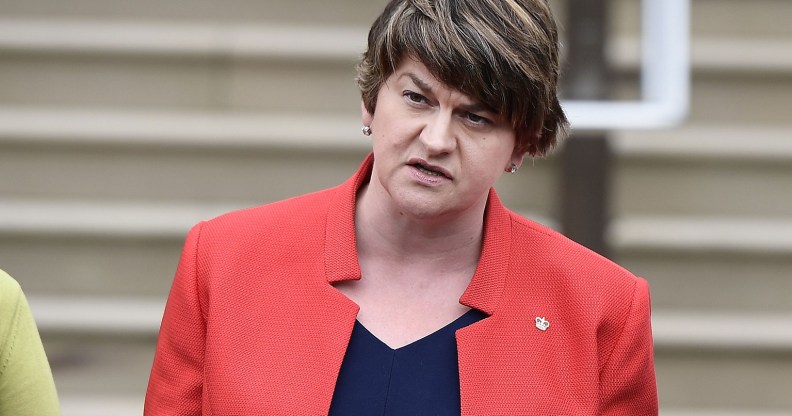Northern Ireland’s First Minister vows to keep blocking equal marriage

The Democratic Unionist Party is planning to continue using peace process powers to block equal marriage in Northern Ireland, despite majority support.
Northern Ireland will be the last place in the British Isles without equal marriage, as Scotland, England and Wales, the Republic of Ireland, the Isle of Man, Jersey and Guernsey have all passed marriage legislation.
All progress continues to be blocked in Northern Ireland however, as the ultra-conservative Democratic Unionist Party employs Petitions of Concern – a power designed to ensure cross-community power sharing – to veto same-sex marriage bills despite a Parliamentary majority in favour.
The party has faced criticism for blocking equal marriage despite a clear majority of support across public demographics.
The DUP ran on a platform of ‘defending marriage’ in Assembly elections earlier this year, and First Minister Arlene Foster this week reaffirmed its plans to continue employing the power to block any future marriage legislation.
Foster insisted: “Why would we, when we feel so strongly about the definition of marriage and the redefining of it, why would we give away that tool [petitions of concern]?”
“I could not care less what people get up to in terms of their sexuality, that’s not a matter for me – when it becomes a matter for me is when people try to redefine marriage.
“It’s there to use and we will use as long as we have the ability to use it.
“If others want to have discussions about getting rid of it completely, then we are up for that discussion.”
She also complained about “abuse” from LGBT activists.
Foster said: “Some of the abuse that is directed at me and colleagues online is very, very vicious.
“And I think if activists want to have a conversation about where they are coming from, do they seriously think they are going to influence me by sending me abuse?
“They are not going to influence me by sending me abuse – in fact, they are going to send me in the opposite direction and people need to reflect on that.”

